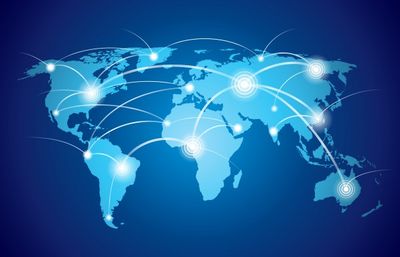Is Globalization Changing the Way We Learn?

The short answer to the question in the title is a resounding Yes. Globalization has accelerated and reshaped not only the way we do business, but it has profoundly changed the way we interact, socialize, play and learn. But this just the tip of our (melting) iceberg.
Table of Contents
Do you want to teach English abroad? Take a TEFL course!
This post was written by our TEFL certification graduate Conrad H. Please note that this blog post might not necessarily represent the beliefs or opinions of ITTT.
Connection
Globalization has connected our seven-plus billion minds in ways that are sure to radically transform language and education. The idea of a global language is an old one, but never in history has it been such a profound reality.
Also Read: How much can I earn teaching English in Chile?
Internet
When addressing the effects of globalization it is important to take the internet into account. Youtube maybe as revolutionary an invention as the Gutenberg press, or perhaps even more so. The ability of humans both literate and illiterate all around the world to access lectures, language lessons, documentaries and information for free is bound to have unimaginable effects on education for centuries to come. Though as with any great invention it's sharp edges cut both ways as we are now experiencing an age of mass misinformation. Though I believe the effects will lean towards a net positive. Here's why.

Access to Information
The dissemination of free information (primarily language learning which is harder to manipulate than philosophical or political information) is and has put more and more people on the same ground, both linguistically, philosophically (think global climate marches, etc) and artistically. The effect is an emerging, globally-connected culture that has (thus far) ushered in an age of unprecedented peace, wealth and, technological and artistic creativity. Put in other words, this is perhaps the greatest time to be alive.
Also Read: "ESA: Teacher's Best Approach"
Disadvantages
There is, however, a downside. The issue is with the method of information consumption. All but gone are the days of deep understanding and deep learning. If you were to google the term "deep learning" you would find results that are almost entirely about machine learning or A.I (Artificial Intelligence), rather than the ability of human beings to learn deeply the information they consume. Additionally, the very sentence that preceded this one is itself an example of shallow understanding. I know very little of AI, but a brief google search and the reading of several sentences pretends to summarize an incredibly complex topic. This is how most of us interact with information and pretend that we are "educated" on a given topic. This is just one of the many ways that Globalization is changing the way we learn.
Also Read: Why Classroom Management Matters
Education
So what is Globalized Education? Globalized Education is learning that is democratized, freely distributed and available to every human on Earth with an internet connection. It is not a concerted effort by any one government or organization (though try as they may), it is an organic, slightly messy slow march out of ignorance for the entire species of humankind that will only continue to spread through the efforts of countless contributors and teachers and even more consumers and students of knowledge and information.
Our technology enables the unimaginable distribution of information and no longer plays a slowing factor in the equation (you don't need to wait for trucks to bring printed books to your village). The biggest obstacle in the Globalized Education of humankind is simply our minds and methods. The challenge that lies ahead is striking a balance between the unimaginable speed of information distribution and our shallow and cursory understanding of the information we consume.
Do you want to teach English abroad? Take a TEFL course!
Or as Dr. Martin Luther King Jr said in one of his brilliant sermons (found in the book "Strength to Love" Published in 1963): "Life at it's best is a creative synthesis of opposites in fruitful harmony." Hopefully deep and slow learning can somehow counterbalance the lightning-fast speed of the information our Globalized world now offers.
Apply now & get certified to teach english abroad!
Speak with an ITTT advisor today to put together your personal plan for teaching English abroad.
Send us an email or call us toll-free at 1-800-490-0531 to speak with an ITTT advisor today.
Related Articles:
- TEFL Breakdown - What Subjects Will Your TEFL Course Cover?
- 5 Reasons Why Teaching English Abroad Enhances Your Career Prospects
- Top 5 Tips: How to Learn a New Language When Teaching English Abroad
- 4 Top Tips for Getting Your TEFL Certificate on the Road
- The How-To Guide for Americans to Teach English in Europe
- 5 Great Places to Teach English Abroad Without a Degree




